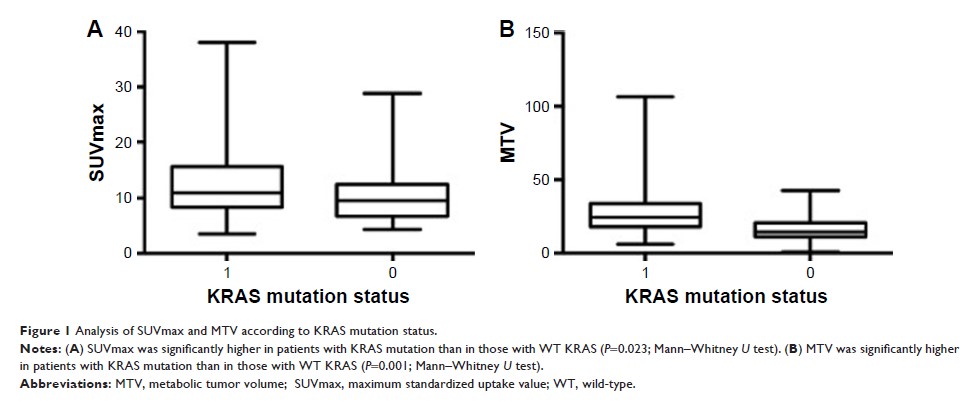108384
论文已发表
注册即可获取德孚的最新动态
IF 收录期刊
- 3.4 Breast Cancer (Dove Med Press)
- 3.2 Clin Epidemiol
- 2.6 Cancer Manag Res
- 2.9 Infect Drug Resist
- 3.7 Clin Interv Aging
- 5.1 Drug Des Dev Ther
- 3.1 Int J Chronic Obstr
- 6.6 Int J Nanomed
- 2.6 Int J Women's Health
- 2.9 Neuropsych Dis Treat
- 2.8 OncoTargets Ther
- 2.0 Patient Prefer Adher
- 2.2 Ther Clin Risk Manag
- 2.5 J Pain Res
- 3.0 Diabet Metab Synd Ob
- 3.2 Psychol Res Behav Ma
- 3.4 Nat Sci Sleep
- 1.8 Pharmgenomics Pers Med
- 2.0 Risk Manag Healthc Policy
- 4.1 J Inflamm Res
- 2.0 Int J Gen Med
- 3.4 J Hepatocell Carcinoma
- 3.0 J Asthma Allergy
- 2.2 Clin Cosmet Investig Dermatol
- 2.4 J Multidiscip Healthc

SUVmax 和代谢肿瘤体积:结直肠癌中 KRAS 突变状态的替代图像生物标志物
Authors Lv Y, Wang X, Liang L, Wang L, Lu J
Received 1 December 2018
Accepted for publication 5 February 2019
Published 21 March 2019 Volume 2019:12 Pages 2115—2121
DOI https://doi.org/10.2147/OTT.S196725
Checked for plagiarism Yes
Review by Single-blind
Peer reviewers approved by Dr Colin Mak
Peer reviewer comments 3
Editor who approved publication: Dr William Cho
Purpose: The
objective of this study was to explore the association between KRAS mutation
status and PET/CT metabolic parameters in colorectal cancer (CRC) patients.
Materials and methods: One
hundred and sixty-four CRC patients were enrolled in this study and received
PET/CT examination before operation, then KRAS mutation status was analyzed
through pathologically confirmed CRC samples. The association between tumor
clinical characteristics and PET/CT metabolic parameters, including maximum
standardized uptake value (SUVmax), SUVmean, and metabolic tumor volume (MTV),
and KRAS mutation status was analyzed using chi-squared tests,
Mann–Whitney U tests, and logistic regression analysis.
Results: The KRAS
mutation type patients exhibited high MTV and high SUVmax using a threshold of
17.8 cm3 and 8.7 respectively and the predictive
accuracy was 0.772 and 0.603 respectively. High MTV (P =0.001; 95% CI:
1.119–1.296) and high SUVmax (P =0.048; 95% CI: 0.564–0.985) were independent
predictors for KRAS mutation status.
Conclusion: MTV and
SUVmax were associated with KRAS mutation type in CRC patients. PET/CT
metabolic parameters can be used for supplementing KRAS mutation status
prediction in CRC patients.
Keywords: colorectal
cancer, 18F-FDG PET/CT, SUVmax, SUVmean, MTV, KRAS
mutation
